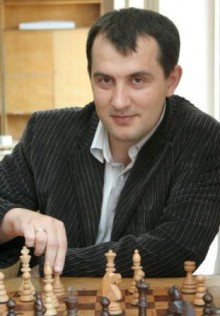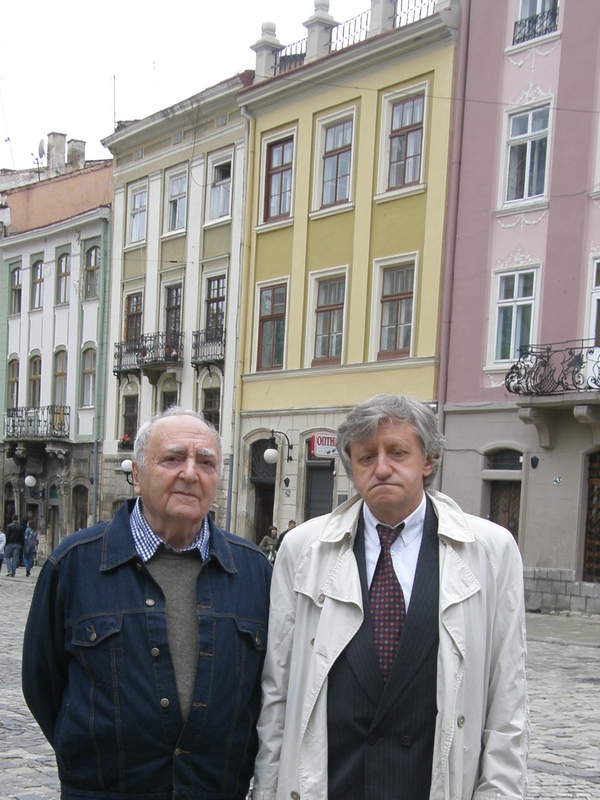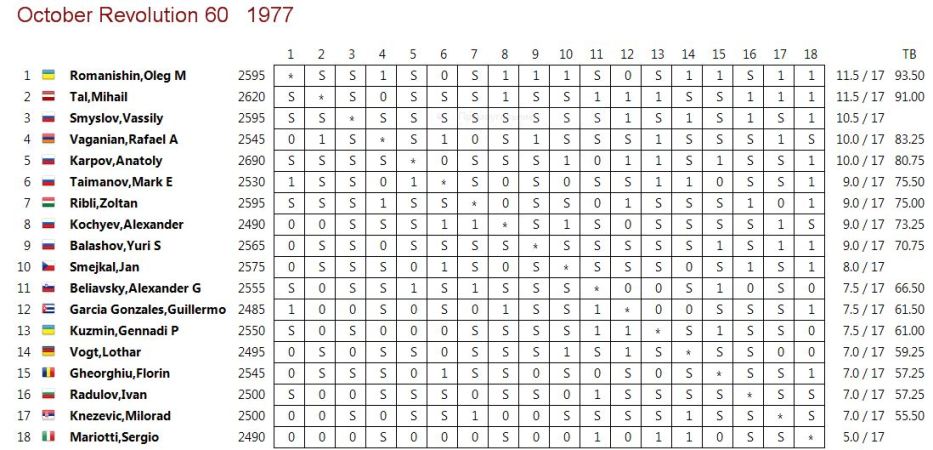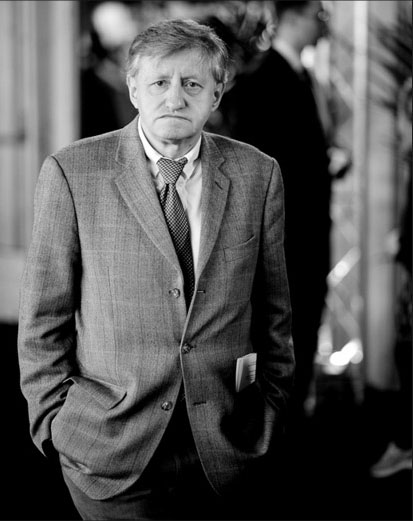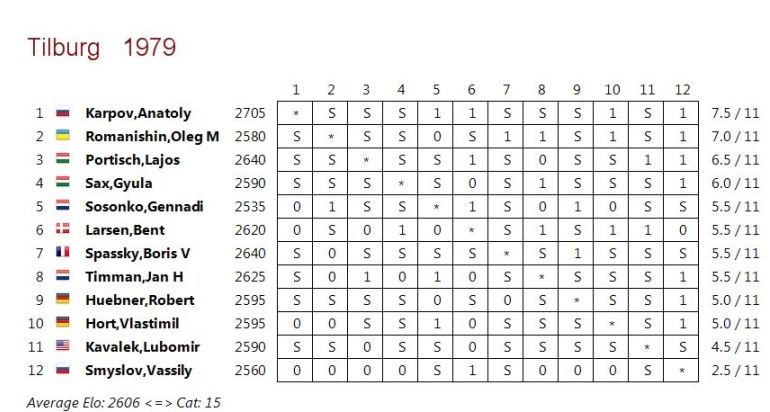Vladimir Grabinsky | |||
Interview with GM Oleg Romanishin  16.07.2013 21:44 16.07.2013 21:44
Interview with GM Oleg Romanishin by Angelmann, courtesy of www.Scacchierando.net The 1st Roseto International Chess Festival has just ended, and we settle down at the bar for a coffee with Oleg Mikhailovich Romanishin, it's time for that interview that was promised to us. Romanishin speaks fluent English, as became evident during the magnificent coaching session held on Wednesday night.
Scacchierando: You learned to play chess when you were 5 …
Oleg Romanishin: Yes, with my father, who was a strong player, he was able to win the Lvov championship, our hometown. My father had a lot of books at home, and there was a nice "chess" atmosphere. I was the youngest in my family, my brothers also played but were less dedicated.
Scacchierando: Chess was very popular in the Soviet Union, back then.
Oleg Romanishin: Yes, definitely, it was the sport with the most following after football! The government actively promoted the game, which was really very popular. Chess was talked about on mainstream media, not only on specialized publications, and there were radio shows. During the 1963 Botvinnik - Petrosjan match ( Romanishin was 11 at the time), there was a news bulletin every hour, and the moves played were given. My father and I used to follow these games with a chessboard, analyzing while waiting for the next moves.
Scacchierando: You then studied with Viktor Kart. Aside from being an excellent coach, was he also a strong player?
Oleg Romanishin: Not really, back then, he was a good Candidate Master (a Russian CM of the time was usually modern-day FM strength), in some way he developed as a player with us, his first group of students, which was myself, Alexander Beliavsky and Adrian Mikhalcisin. Stein's successes, who was a good friend of Kart's, boosted the chess scene in Lviv. In 1973 I won the Youth European championship, while Beliavsky won the World Championship. Viktor dedicated himself to us with passion and competence.
Kart and Romanishin
Mikhalchishin, Romanishin, Beliavsky
Scacchierando: Did you develop rapidly as a player?
Oleg Romanishin: Yes, I became Candidate master at 14 and Master at 16. I obtained my IM title when I won the European championship and I became GM in 1976 (by this time he had already taken part in two Soviet Championship finals, with a wonderful 2nd place in 1975 with Tal and Vaganjan, behind the winner Petrosjan).
Scacchierando: As a promising youngster, you were assisted by Tal.
Oleg Romanishin: No, that's not correct. I was sent to play a tournament with Tal. Then, in 1975, we played together again and became good friends. We had three training sessions together. In 1977 we were joint-winners of the Leningrad tournament, ahead of Karpov, Smyslov, Vaganjan, Taimanov, Ribli, Balashov, Beliavsky … I have been very lucky, having had the opportunity of playing and working with great champions.
Scacchierando: Has your playing style been influenced by anyone in particular?
Oleg Romanishin: I wouldn't say as much … You learn from everyone, from many different styles. It was the strength of the Soviet Union, back then, there were many very strong players, who cultivated many different ideas. I have always valued the insights that different points of view can give you. I have played with nearly every player, even with Leonid Stein (said with a smile, remembering the great Ukrainian champion, who died prematurely). Young players today work a lot with databases but have less opportunities to work with great champions. Chess has changed, it's become quicker, maybe too much so, young players have the adequate energy for present-day Chess. After a 5-6 hour game I am exhausted, and let's not even talk about double rounds … Scacchierando: You are an attacking player, and an accomplished openings expert.
Oleg Romanishin: It was easier once, to try theoretical novelties, if you were willing to work at the chessboard. Today, you play a novelty and after a few hours it is known all over the world. I have always played for the win, without much consideration to tournament tactics. When I have played with caution I have not always fared well. In 1975 I played a tournament in Olot, Spain. At one point I was leading with Csom and Filip, on 7.5. The following round I was paired with white against Csom, who used to play a kind of "hedgehog" formation. Before the game I came up with a novelty in the sequence 1. Nf3 Nf6 2. c4 e6 3. Nc3 b6 4. e4 Bb7, playing Bd3 on my fifth move (the move had already been tried by Huebner against Johannessen in Oslo the previous year, but databases weren't around at the time, and Romanishin didn't know that game). However, I didn't want to take risks, I played a different move and lost badly. I was very unhappy about this, and I spent the whole night analysing the game and my new variation. At the end of the same year, in the Soviet Championship played in Yerevan, I played against Petrosian and this time went ahead with Bd3, winning a nice game! The following day Lev Polugaevsky played the same way against Boris Gulko, and then it was taken up by Tal and many others. In that Championship I played another strong novelty against Geller. I remember Petrosian telling me that even if I could play two novelties per tournament, I then had to play all the other games as well! There is a little curiosity - in 1996, 21 years later, during the Yerevan Chess Olympiad, I went to a chemist and the man behind the counter exclaimed: "I know you! You destroyed our great Petrosjan in the 1975 championship!". I found myself in a similar situation in the penultimate round of the Groningen tournament, in 1993, in a game where I had the black pieces against Beliavsky, which was decisive for qualification in the candidates tournament of the PCA. Two hours before the game I came up with a novelty in the Capablanca variation in the Nimzo-Indian, Qf5. (1.d4 Nf6 2. c4 e6 3. Nc3 Bb4 4. Qc2 d5 5. cxd5 Qxd5 6. Nf3 Qf5) This time, as opposed to what happened with Bd3, I played it and won! In the last round I played against Benjamin, I didn't calculate, I played for a win and everything went well and I finished on 7 out of 11.
Scacchierando: You played against many World Champions.
Oleg Romanishin: Yes, many times. I am ahead on points with Tal, Petrosian and Spassky, and with Kasparov also, even if I only played him when he was very young, before he became World Champion. I have a very bad score against Karpov. Talking about varieties of approaches, Karpov has a very global view of the board. When analysing a position, he tends to consider what pieces to exchange, which to improve, and formulate a general play rather than calculating variations. At the other end there is Ivanchuk, with whom I spent some time in training. Ivanchuk relies on his exceptional memory and calculation, with very deep variations, sometimes even fifteen moves ahead! Scacchierando: You won here in Roseto!
Oleg Romanishin: Oh yes, I did, but my opponents were quite helpful!
Scacchierando: You have won many tournaments, do you remember how many?
Oleg Romanishin: No, not at all! You then have to distinguish between different tournaments. A second or third place in a world class tournament is of considerable importance. I have won important tournaments, like Odessa 1974, Hastings 1976, the aforementioned Leningrad 1977, Jumala 1983, Moscow 1985, but I also remember with pleasure, for example, my second place in Tilburg 1979, half a point behind Karpov and ahead of many great players, such as Portisch, Larsen, Spassky, Timman, Smyslov, Huebner, Hort, Sax, Sosonko and Kavalek … an extremely hard tournament!
Scacchierando: Is there a game you are especially attached to?
Oleg Romanishin: All of them! Maybe I am especially proud of some of them, like the one against Tibor Karolyi, in Tbilisi in 1986, with a nice sacrifice, an incredible game. Even the one against Amador Rodriguez, in 1977, a particularly interesting game, with many consecutive pawn moves, and, most definitely, my win against Spassky in Tilburg and the games against Petrosjan and Beliavsky we already talked about.
Scacchierando: You have played in the Chess Olympiads with both the Soviet Union and the Ukraine.
Oleg Romanishin: In 1978, in Buenos Aires, I was selected since Karpov was playing his match with Korchnoi. I have been close to being selected on other occasions, but that was my only chance at the Olympics with the USSR , while in the European Championships I won 6 gold medals. With the Ukraine I have won two silver medals and two bronze. I don't think much of the current team-point system. I am especially against FIDE's "zero tolerance" rule, which I consider to be absolutely idiotic, particularly in a tournament like the Olympiad, with thousands of people in the playing hall. All you need is a little inconvenience to be late. It is a nonsensical rule for chess. In tennis, and tennis has great TV obligations, you are allowed up to a quarter of an hour! And in tennis, and in many other sports, the warm-up is held on the pitch, while in chess that isn't the case. At Wijk aan Zee you have to pay a penalty if you are late, the highest being in the A tournament. I think it's a good compromise.
Scacchierando: You have been playing Chess for 50 years, do you still harbour the same passion for the game?
Oleg Romanishin: When I was younger I was more motivated, I was very ambitious. Today I make a living with chess, but yes, I still love them very much to this day.
Scacchierando: Is there a champion of the past you particularly admire?
Oleg Romanishin: All of them! As I mentioned about the Soviet School, the plurality of views and styles is an asset. I am sorry I was never able to play with Keres, he played his last Soviet Championship in 1973, while I played my first in 1974, but I still had the chance to get to know him! (Said with a smile which was similar to the one he had remembering Stein, a sign of respect and fondness for the memory).
Here the interview, which lasted over two hours, comes to an end, but not our afternoon with Oleg! We offer to give him a lift to the prize-giving, which will be held in the town's main square. While waiting for the ceremony to begin, we adjourn to a chessboard in the analysis room where Stefano asks Romanishin's opinion about a few side-variations in the Nimzo-Indian. We go to the prize-giving and we then walk Romanishin to buy his bus ticket, and checking with the hotel that he could get a lift to the station, and we are joined by IM Misa Pap.
We had a chance for further talks, and not only about chess. We talk about Rome, and it is immediately obvious the interest a chess tournament in Rome could entail. Romanishin finds a common interest with Stefano in tennis, a sport that he discovered late in his life but that he likes a lot. Oleg has a 16-years old daughter who is a rather promising player, and is already playing in international youth tournaments. After the tournament in Balaton, Romanishin will play an Open in Germany, and his agenda is already fully booked well into September, but no further tournaments in Italy are planned for the moment.
We return to the village and after dinner we part ways. On our drive back to Rome, Stefano and I look back on the nice days in Roseto and the wonderful afternoon. It really has been a great pleasure to get to know Oleg Mikhailovich Romanishin!
| |||
|
|


